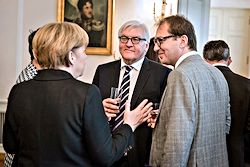Editorial comment: Nick Ottens has clearly swallowed the US/NATO propaganda about Ukraine, lock, stock and barrel. Russia did not invade Crimea or southeastern Ukraine. As Putin said at the G20 meeting recently -- they can't get out of Ukraine, since they are not in it.
The 'large street protests [on the Maidan] in Kiev' in February this year took place because the U.S. heavily supported some partly neo-Nazi elements who were anti-Russia and pro-U.S. (since they were largely financed by the U.S. of course). The entire 'revolution' could never have taken such proportions without that support.
Concerning "Russian weapons shot down a commercial airliner with hundreds of European passengers onboard", it has actually been proven by forensic experts that the plane was shot down by a Kiev fighter plane that was flying side by side with the MH17 Malaysian jet. See Desperate MH17 “Intelligence” Spin. from Global Research. There was no trace of any ground-to-air missile range anywhere on the southeastern separatist territory.
Still, we find it of great importance that someone in a high political position is rebelling against the anti-Russian sanctions. - SON
___________
 |
| German chancellor Angela Merkel talks with her foreign minister, Frank-Walter Steinmeier, and other colleagues in Berlin, December 17, 2013 (Bundesregierung) |
Germany’s foreign minister, Frank-Walter Steinmeier, warned against
imposing more sanctions on Russia in an interview that was published on
Friday, saying bringing Russia to its knees would not make Europe safer.
I can only warn against it,” Steinmeier told Der Spiegel.
The diplomat pointed out that Russia is already paying the price for
invading Ukraine in the form of falling oil prices and a collapsing
currency. He argued, “It cannot be in our interest that this spirals out
of control.”
Earlier in the week, German chancellor Angela Merkel, whose
conservatives are the senior partners in the ruling coalition with
Steinmeier’s Social Democratic Party, insisted the sanctions would not
be weakened.
Speaking to lawmakers in Berlin ahead of a meeting with other
European leaders in Brussels, Merkel said the territorial integrity of
Ukraine had to be restored. “As long as this goal is not achieved, the
sanctions will stay,” she said.
European Union leaders agreed on Friday to keep existing sanctions in
place and said they were ready to “stay the course” if Russia did not
pull back from Ukraine.
European countries imposed economic and financial sanctions after
Russia invaded and annexed the Crimean Peninsula from Ukraine in March.
They strengthened the embargo after separatists fighting in the
southeast of Ukraine with Russian weapons shot down a commercial
airliner with hundreds of European passengers onboard.
The punitive measures have contributed to the Russian ruble losing
more than half its value against the American dollar since the start of
the year.
Oil prices have also dropped far below the $100 per barrel Russia
needs in order to balance its budget. The Russian central bank expects
the economy will contract between 4.5 and 4.7 percent next year if oil
stays below $60.
Whereas the otherwise cautious Merkel has emerged as a key nemesis of
Russian president Vladimir Putin’s policy in Eastern Europe, the Social
Democrats have traditionally been more Russia-friendly. Their former
leader, Gerhard Schröder, once famously described Putin as a “flawless
democrat” and chairs the company that operates the submarine Nord Stream
pipeline that delivers Russian natural gas to Germany.
The cooling in German-Russian relations preceded the crisis in Ukraine.
Last year, Merkel lashed out at Russia’s treatment of nongovernmental
organizations, some of which were banned in the country, saying
economic progress could only happen “most successfully when there is an
active civil society.”
It wasn’t until large street protests in Kiev forced Ukraine’s
relatively pro-Russian president, Viktor Yanukovich, to resign in
February, after he had unexpectedly pulled out of an association
agreement with the European Union, that Germany took a more active role.
However, its attempts at mediating between the Ukrainian government and
the opposition bore little fruit.
German gets roughly a third of its natural gas from Russia while
German exports to the country were worth €36 billion last year.
Lobbyists claim up to three hundred thousand German jobs depend on the
trade.
Source: Atlanticsentinel
|

